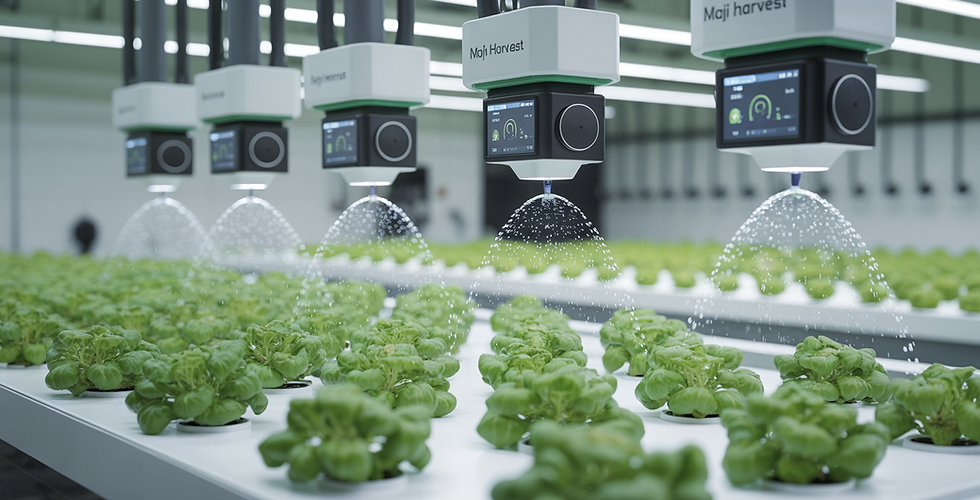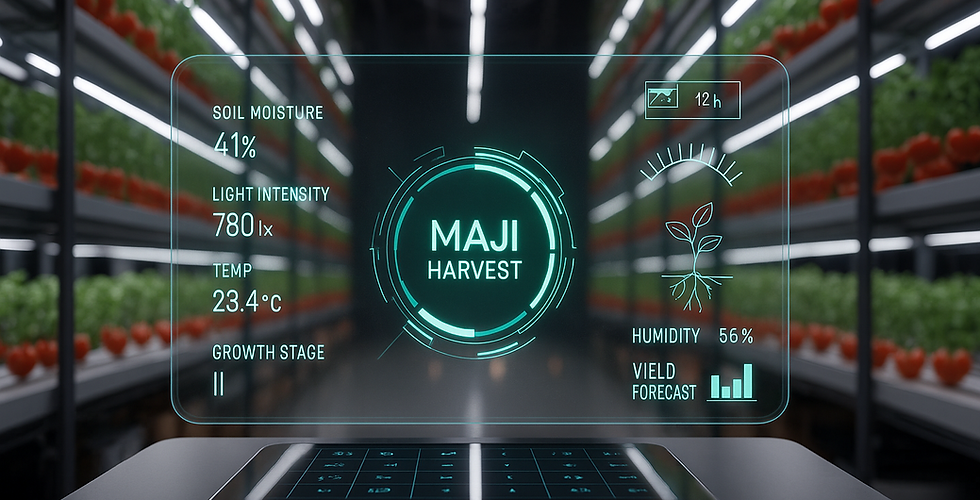Maji Harvest is a smart farming company focused on solving water scarcity and climate challenges through advanced technology. Our name, meaning “water” in Swahili, reflects our mission to enable sustainable agriculture by optimizing water use.
We develop AI-driven, IoT-enabled solutions powered by renewable energy to help farmers in vulnerable regions increase crop yields and improve livelihoods. Targeting Africa and similar climate zones in Latin America and South Asia, we partner with governments and NGOs to transform traditional farming into efficient, resilient smart farms.

➤ Smart Irrigation AI
An AI-driven system that integrates crop growth cycles, soil moisture, and weather data to determine optimal irrigation timing and volumes automatically. This model achieves up to 50% water savings.
➤ IoT Farm Infrastructure
A sensor network that collects real-time data on soil moisture, temperature, sunlight, and atmospheric pressure. Dual communication via GSM and LoRa ensures reliable operation even in areas with unstable internet connectivity.
➤ Energy-Autonomous Hardware
All equipment operates on solar power with low-energy design, allowing independent operation in regions without electricity infrastructure. Batteries and charging controllers meet durability and safety standards.
➤ Predictive Analytics Platform
AI models trained on crop growth data predict pest outbreaks, harvest times, and water deficiency risks. All data is visualized on web and mobile dashboards with remote control capabilities.
➤ Multilingual User Interface
Designed for ease of use by non-technical farmers, featuring intuitive UI/UX and support for English, Swahili, Arabic, Spanish, and other languages.

Maji Harvest’s smart farming technology is designed for application in water-scarce and climate-vulnerable areas, optimized especially for arid and semi-arid climates prone to desertification.
African Regions
-
East Africa: Highlands and dry areas of Ethiopia, Kenya, Uganda
-
West Africa: Sahel belt, Niger River basin with seasonal droughts
-
North Africa: Mediterranean-desert mixed climates in Morocco, Algeria, Egypt
-
Southern Africa: Semi-arid highlands including Namibia, Botswana, Lesotho
Climatically Similar Regions
-
South Asia: Northern India, Pakistan, Bangladesh
-
Middle East: Jordan, Lebanon, Iraq
-
Latin America: Peru, Mexico, Brazilian interior
-
Southeast Asia: Inland Myanmar, Cambodia, Philippines
Applicable Climate Conditions
-
Annual rainfall between 300-800mm
-
Areas with poor electricity infrastructure
-
Hot, dry, and seasonal drought environments

➤ Water Use Reduction
By applying AI-driven irrigation algorithms, water consumption can be reduced by up to 45%, playing a crucial role in groundwater conservation and enhancing drought resilience.
➤ Productivity Improvement
Reducing crop water stress is expected to increase yields by an average of 1.5 to 2.0 times, with particularly strong effects on tropical and heat-sensitive crops.
➤ Farmer Income Enhancement
Farmers using Maji Harvest’s smart farming technology will benefit from increased crop production and decreased water and energy waste. This results in higher earnings, improved living standards, and the ability to sustainably expand their farms.
➤ Energy Self-Sufficiency
The system operates fully on solar power and battery storage, ensuring reliable function in off-grid areas without any external energy costs.
➤ Carbon Emission Reduction
Optimized irrigation and fertilizer management are projected to reduce carbon emissions by approximately 1 ton CO₂ equivalent per hectare annually.
